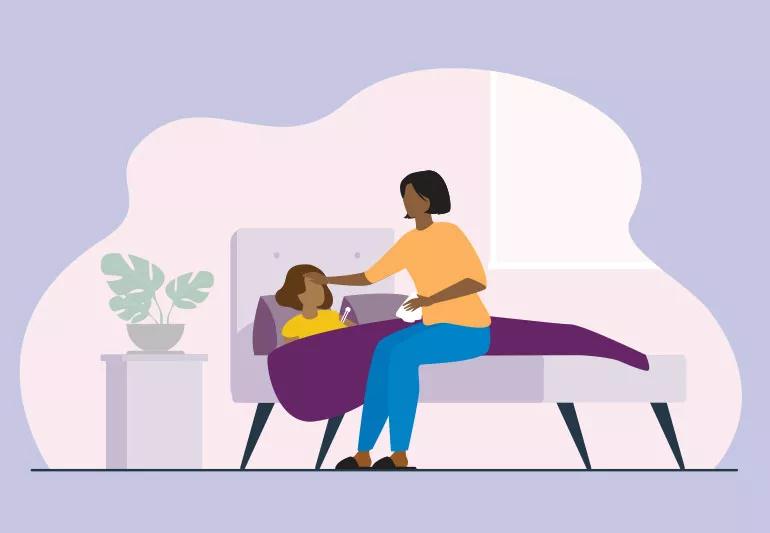“What to Know About the Unusual RSV Outbreak”
An expert's advice on another virus that's a risk to children
While COVID-19 continues, a new surge in cases of another respiratory illness has doctors alarmed. A summer spike in instances of respiratory syncytial virus (RSV) has spread across the country even though the illness typically peaks during the fall and winter.
What makes matters more concerning is that RSV is highly contagious and is particularly prevalent among children. This outbreak further complicates a new school year that already faces unprecedented challenges thanks to the delta variant-fueled COVID-19 spread.
To better understand what RSV is, what’s going on with the current outbreak and to learn how to protect your children and yourself from the virus, we spoke with pediatric infectious disease expert Camille Sabella, MD.
What is RSV?
Respiratory syncytial virus (RSV) is a seasonal respiratory virus that’s highly contagious and mostly affects children. While adults can also develop RSV infections, it’s most common among young children, especially those under 2 years of age.
Symptoms in infants can include:
Runny nose.
Fever (though not always present).
Sneezing.
Coughing.
Decreased appetite.
In older children and adults, additional symptoms can include:
Runny nose.
Congestion.
Mild headache.
Sore throat.
Fever.
Cough.
Tiredness.
Serious cases can cause respiratory distress and failure and even develop into pneumonia or bronchitis.
“The older you are, the better the chance that you’ve had it before, says Dr. Sabella. “So there’s some protection provided in adults even if they’re still susceptible to infection. They just tend to have more mild symptoms.”
Typically a seasonal disorder running from late fall to early spring, like the flu, a summer surge in RSV cases has doctors stumped. “It’s a bit of a different phenomenon right now,” says Dr. Sabella. “We usually don’t start seeing RSV rising until November or December, so this is very unusual.”
Why are cases of RSV rising?
The strange part, says Dr. Sabella, is that healthcare providers still don’t yet know what’s caused RSV to surge out of season. “What’s particularly strange is that since the COVID-19 pandemic hit the U.S. in the spring of 2020, RSV almost completely disappeared,” he said.
It’s possible that as COVID-19 guidelines – like masks, social distancing and improved hand hygiene – helped curtail RSV cases for a while, and the relaxation of those guidelines in the wake of the vaccine rollout also fueled this RSV rise.
How long is RSV contagious?
Most people who become infected with RSV are contagious for three to eight days, according to the Centers for Disease Control and Prevention (CDC). However, the organization also notes, “some infants and people with weakened immune systems can spread the virus even after they stop showing symptoms, for as long as four weeks.”
Part of why RSV is so common among children is how it’s passed around. Not only can you catch it from infected droplets in the cough or sneeze of an infected person, but the virus also lives on surfaces and objects.
It’s incredibly easy to become infected simply by touching a doorknob that has the virus and then touching your face before washing your hands. While the virus may not live on your hands for very long, it can live on surfaces for hours at a time, says the CDC.
How to protect your child
Because RSV is so contagious and easy to pass around, anything you can do to help protect your children – and yourself – is key.
RSV is more likely to spread through contact, Dr. Sabella points out, so proper hand hygiene is an important step in protection. “Washing your hands thoroughly is the best way to protect yourself against the virus,” he says. “That’s not always easy to do with infants and young children, so parents have to be vigilant.”
Additionally, keep surfaces wiped down and clean. “Because this virus can live for a time on inanimate objects, keeping toys and other common things that your children handle wiped down is vital,” he adds.
Washing with soap and warm water and wiping them down with disinfectants are good ways to keep these surfaces and objects clean.
What treatments are available for RSV?
Unfortunately, Dr. Sabella notes, there are no specific treatments for RSV. “It’s mainly supportive treatments,” he says, “like hydration or even oxygen therapy if their oxygen level is low or there are respiratory issues.”
If patients develop respiratory distress or pneumonia, he adds, hospitalization might occur to help support the patient but, beyond that, it’s mostly just letting the virus run its course.
Right now, an RSV vaccine is not available, although several vaccines are in clinical trials — including an mRNA-based one developed by Moderna. Children under the age of 24 months with certain lung or heart conditions might also benefit from a monthly preventative injection of monoclonal antibodies (a medicine known as SYNAGIS) that can reduce the risk of severe RSV lung infections.
How can you tell the difference between RSV and COVID-19?
Because RSV and COVID-19 share similar symptoms, many parents might be concerned about differentiating between the two. Unfortunately, says Dr. Sabella, there’s really no way of knowing short of getting a test.
“It’s very difficult to distinguish COVID-19 from RSV from other respiratory viruses, which are also prevalent at this time, without specific testing,” he says. “Fortunately, most children with RSV or COVID-19 experience relatively mild symptoms.”
Still, he says, you should call your child’s pediatrician or primary care provider if they develop respiratory issues.
As RSV cases show an unusual summer surge, an expert weighs in on what you should know about the virus and how to protect your children and yourself.

health.clevelandclinic.org
I wonder how many Covid cases are being mistaken for RSV considering all the false positive test results from Covid testing.

